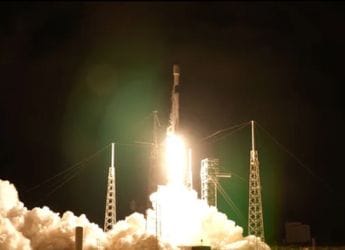- Home
- Science
- Science News
- China Launches Military Satellite That Will Test 'Space Debris Mitigation Technology': State Media
China Launches Military Satellite That Will Test 'Space Debris Mitigation Technology': State Media
The satellite was placed into “a geosynchronous transfer orbit.”

Photo Credit: SpaceChina.com
The satellite was launched from the Xichang Satellite Launch Centre
China has launched a military satellite that will test its “space debris mitigation technology," the state media reported earlier this week. The satellite was launched on Sunday from the Xichang Satellite Launch Centre, Sichuan province, Southwest China. Though only a few details were available about the classified launch, some state media reports said the mission was successful. A video of the launch showed a gigantic rocket blasting off the launch site into a cloud of orange hues against a background of mountains or hills. The satellite onboard the Long March 3B rocket is called Shijian-21.
The satellite will be "used for the verification of space debris mitigation technology," China Central Television (CCTV) said in a report. The China Aerospace Science and Technology Corporation — a state-owned enterprise designing, manufacturing, and launching space systems — added the launch was a "complete success" as the satellite achieved its intended orbit. It did not, however, say which orbit the satellite entered. A SpaceNews report, however, said the satellite was placed into “a geosynchronous transfer orbit.” Watch the liftoff here.
The Chinese mission took place amidst a global drift towards reducing space debris or creating technologies to do that. Since the space debris mitigation technologies are “dual-use,” with both civilian and military applications, the satellite is likely to attract interest outside China. Though Chinese state media suggested the launch was aimed at testing space debris removal technology, the same capabilities could also be used to disable spacecraft of adversaries.
China's space programme has attracted wider scrutiny of late, especially after it allowed a rocket to fall back uncontrolled to Earth. The rocket part disintegrated over the Indian Ocean but there was immense speculation where the 18-tonne object would hit. The country has invested billions of dollars into space exploration to boost its global stature and technological might.
Catch the latest from the Consumer Electronics Show on Gadgets 360, at our CES 2026 hub.
Related Stories
- Samsung Galaxy Unpacked 2025
- ChatGPT
- Redmi Note 14 Pro+
- iPhone 16
- Apple Vision Pro
- Oneplus 12
- OnePlus Nord CE 3 Lite 5G
- iPhone 13
- Xiaomi 14 Pro
- Oppo Find N3
- Tecno Spark Go (2023)
- Realme V30
- Best Phones Under 25000
- Samsung Galaxy S24 Series
- Cryptocurrency
- iQoo 12
- Samsung Galaxy S24 Ultra
- Giottus
- Samsung Galaxy Z Flip 5
- Apple 'Scary Fast'
- Housefull 5
- GoPro Hero 12 Black Review
- Invincible Season 2
- JioGlass
- HD Ready TV
- Laptop Under 50000
- Smartwatch Under 10000
- Latest Mobile Phones
- Compare Phones
- Red Magic 11 Air
- Honor Magic 8 RSR Porsche Design
- Honor Magic 8 Pro Air
- Infinix Note Edge
- Lava Blaze Duo 3
- Tecno Spark Go 3
- iQOO Z11 Turbo
- OPPO A6c
- Lenovo Yoga Slim 7x (2025)
- Lenovo Yoga Slim 7a
- Lenovo Idea Tab Plus
- Realme Pad 3
- Moto Watch
- Garmin Quatix 8 Pro
- Haier H5E Series
- Acerpure Nitro Z Series 100-inch QLED TV
- Asus ROG Ally
- Nintendo Switch Lite
- Haier 1.6 Ton 5 Star Inverter Split AC (HSU19G-MZAID5BN-INV)
- Haier 1.6 Ton 5 Star Inverter Split AC (HSU19G-MZAIM5BN-INV)






![[Sponsored] Haier C90 OLED TV | Dolby Vision IQ, 144Hz OLED and Google TV in Action](https://www.gadgets360.com/static/mobile/images/spacer.png)









